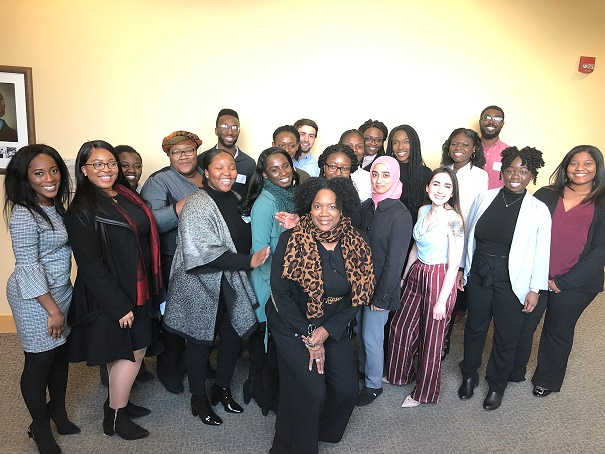Understanding diversity leads to compassionate care
Teaching future doctors and medical professionals the importance of acceptance and inclusion is essential in helping them provide quality, compassionate care to patients, according to Vicki T. Sapp, PhD, director of student engagement, diversity and inclusion at Geisinger Commonwealth School of Medicine.
“My goal is to help students identify prejudices and biases and offer them a different perspective to overcome these potentially harmful ideas, so they can form true connections with the patients they care for,” says Dr. Sapp, assistant professor at the medical school. She shares her knowledge with many of the school’s more than 400 students, who come from diverse backgrounds. She also speaks at events across the country about ways to break down systematic prejudice and advocate for the underrepresented in society, particularly concerning healthcare.
Students are immersed in diversity and inclusion initiatives at the school to gain insight into varying cultural perspectives. The school holds workshops and festivals to highlight the cultural diversity among its student population. Every January, the school celebrates Diversity Week, which culminates in a fashion show that gives students the opportunity to share their cultural attire and regional music as they walk the runway. A recently created video, shown here, features students from all backgrounds speaking in their native languages about the importance of acceptance and inclusion in building a community of caring.
At a Racism in Medicine conference held this winter at Drexel University's College of Medicine in Philadelphia, Dr. Sapp and 23 Geisinger Commonwealth School of Medicine students, along with other healthcare professionals, examined the ways racism affects the health of marginalized people and discussed strategies to oppose it. Dr. Sapp presented a breakout session that addressed microaggressions in medical school education.
"The students were excited to learn what microaggressions are," Dr. Sapp says. "In the past, they just knew they were having feelings. The workshop provided the tools and the vocabulary to know the feelings, to ask questions and to clarify. While this is useful in interacting with their peers, the ultimate goal is for the students to take what they learn and use it with patients when they are doctors — to be sure their patients feel understood."
“My goal is to help students identify prejudices and biases and offer them a different perspective to overcome these potentially harmful ideas, so they can form true connections with the patients they care for,” says Dr. Sapp, assistant professor at the medical school. She shares her knowledge with many of the school’s more than 400 students, who come from diverse backgrounds. She also speaks at events across the country about ways to break down systematic prejudice and advocate for the underrepresented in society, particularly concerning healthcare.
Students are immersed in diversity and inclusion initiatives at the school to gain insight into varying cultural perspectives. The school holds workshops and festivals to highlight the cultural diversity among its student population. Every January, the school celebrates Diversity Week, which culminates in a fashion show that gives students the opportunity to share their cultural attire and regional music as they walk the runway. A recently created video, shown here, features students from all backgrounds speaking in their native languages about the importance of acceptance and inclusion in building a community of caring.
At a Racism in Medicine conference held this winter at Drexel University's College of Medicine in Philadelphia, Dr. Sapp and 23 Geisinger Commonwealth School of Medicine students, along with other healthcare professionals, examined the ways racism affects the health of marginalized people and discussed strategies to oppose it. Dr. Sapp presented a breakout session that addressed microaggressions in medical school education.
"The students were excited to learn what microaggressions are," Dr. Sapp says. "In the past, they just knew they were having feelings. The workshop provided the tools and the vocabulary to know the feelings, to ask questions and to clarify. While this is useful in interacting with their peers, the ultimate goal is for the students to take what they learn and use it with patients when they are doctors — to be sure their patients feel understood."

Content from General Links with modal content
